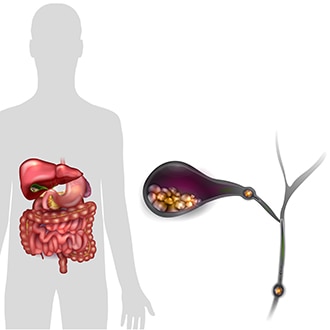Symptoms & Causes of Gallstones
What are the symptoms of gallstones?
If gallstones block your bile ducts, bile could build up in your gallbladder, causing a gallbladder attack, sometimes called biliary colic. Gallbladder attacks usually cause pain in your upper right abdomen, sometimes lasting several hours. Gallbladder attacks often follow heavy meals and usually occur in the evening or during the night. If you’ve had one gallbladder attack, more attacks will likely follow.
Gallbladder attacks usually stop when gallstones move and no longer block the bile ducts. However, if any of your bile ducts stay blocked for more than a few hours, you may develop gallstone complications. Gallstones that do not block your bile ducts do not cause symptoms.

Silent gallstones
Most people with gallstones do not have symptoms. Gallstones that do not cause symptoms are called silent gallstones. Silent gallstones don’t stop your gallbladder, liver, or pancreas from working, so they do not need treatment.
Seek care right away for a gallbladder attack
See a doctor right away if you are having these symptoms during or after a gallbladder attack:
- pain in your abdomen lasting several hours
- nausea and vomiting
- fever—even a low-grade fever—or chills
- yellowish color of your skin or whites of your eyes, called jaundice
- tea-colored urine and light-colored stools
These symptoms may be signs of a serious infection or inflammation of the gallbladder, liver, or pancreas. Gallstone symptoms may be similar to symptoms of other conditions, such as appendicitis, ulcers, pancreatitis, and gastroesophageal reflux disease, all of which should be treated by a doctor as soon as possible.
Gallstone complications can occur if your bile ducts stay blocked. Left untreated, blockages of the bile ducts or pancreatic duct can be fatal.
What causes gallstones?
Gallstones may form if bile contains too much cholesterol, too much bilirubin, or not enough bile salts. Researchers do not fully understand why these changes in bile occur. Gallstones also may form if the gallbladder does not empty completely or often enough. Certain people are more likely to have gallstones than others because of their risk factors for gallstones, including obesity and certain kinds of dieting.
This content is provided as a service of the National Institute of Diabetes and Digestive and Kidney Diseases
(NIDDK), part of the National Institutes of Health. NIDDK translates and disseminates research findings to increase knowledge and understanding about health and disease among patients, health professionals, and the public. Content produced by NIDDK is carefully reviewed by NIDDK scientists and other experts.
